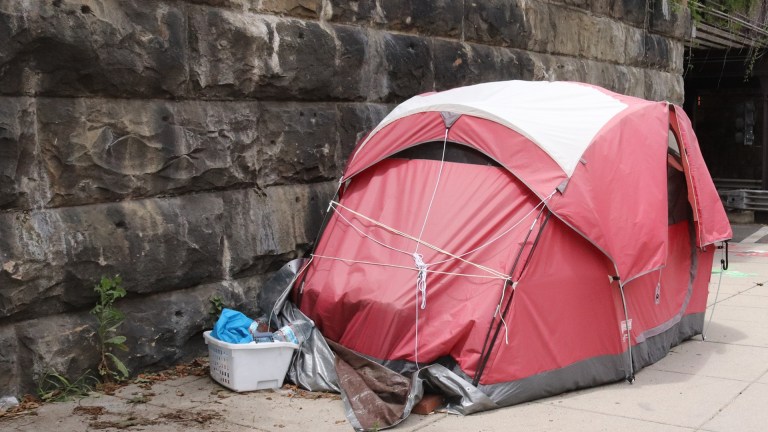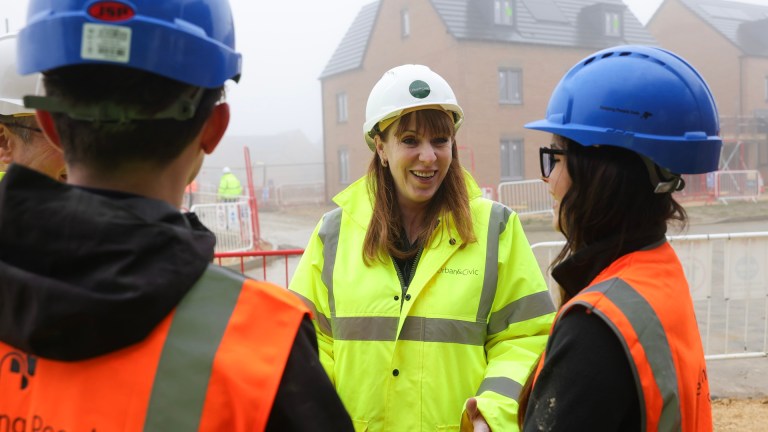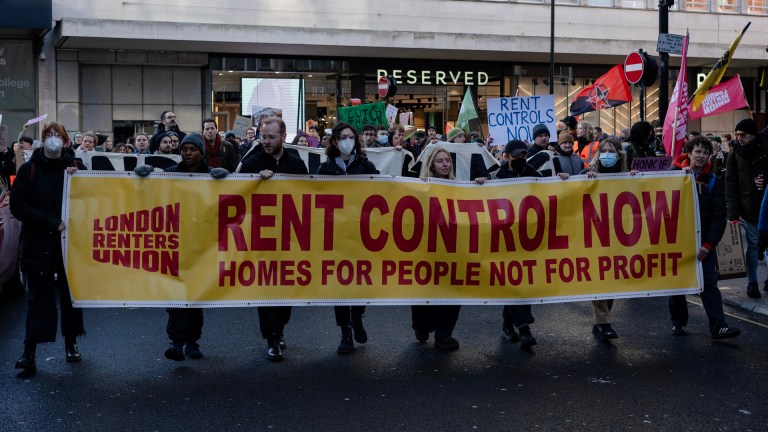Norcott adds: “We’re usually finished for Christmas by now. We’ve got nowhere to store [presents] but you’re having to make sure we’ve got enough food to last for the month, enough bus fare to last for the month. Christmas is an afterthought at the moment.
“We don’t want to make plans really because we don’t know if we’re going to be here or not.”
The family are far from alone in facing homelessness this Christmas. In fact, 2024 was the year when surging numbers of people in temporary accommodation moved beyond a crisis, graduating to an existential threat for some councils.
At the start of 2024, 112,660 households were living in temporary accommodation in England, according to official statistics, up 12.1% on the same point a year earlier. By the end of March, that figure had soared to 117,450 households – 12.3% higher than in 2023. Three months later it had grown to 123,100 households – a staggering 16.3% increase from June 2023. That includes more than 159,000 children.
It’s an issue in Wales and Scotland too. The 6,447 households placed in temporary accommodation across Wales in March 2024 represented an 18% annual increase. A total of 16,330 households were in the same position in Scotland, up 9% in a single year.
Temporary accommodation costs are setting back councils £2.3bn a year in England, according to Crisis analysis, and that figure is set to climb further as households feel the effects of sky-high rents and continued cost of living pressures. That has led to warnings that councils face bankruptcy. One of the most vocal local authorities on the issue – Eastbourne Borough Council – said that it was spending 49p of every £1 in its budget on temporary accommo-dation costs.
London is the epicentre of the crisis, with 56% of England’s total placements, amounting to 175,000 Londoners without a secure home and equivalent to one in every 50 residents or one homeless child in every London classroom.
Three London boroughs are receiving exceptional financial support, with more expected to need Westminster government funding to stave off bankruptcy in 2025. Collectively, London boroughs are spending around £90m per month – approximately £3m every day – on temporary accommodation, up nearly 40% from a year earlier.
It’s a crisis that is creating shockwaves elsewhere too, with families placed outside of London, owing to a lack of space.
And yet, the situation is flying under the radar according to Dr Laura Neilson, the chief executive of Shared Health Foundation – a charity which has been supporting the family.
“It should be shameful that this Christmas more than 159,000 children will be living in temporary accommodation. It should be a national conversation, an embarrassment the government tackles head on with urgency. Yet it remains a fringe conversation,” said Dr Neilson.
“Twenty-thousand babies will have Christmas this year where there are no kitchens for cooking, no place to crawl or walk, where they could be moved at a moment’s notice across town, across a city, across the country.
“Family after family tell us of living in fear, in unsafe conditions, often miles from family, friends and support. As a society we are paying a huge cost. Last year temporary accommodation cost £2.3bn. Socially we see children fall out of education, fall behind, become unwell. For some babies the tough conditions are too much. We expect the number of babies who die unexpectedly in TA to rise again this year. We can do better. We must do better.”
But for Norcott and Turner in Oldham it’s the day-to-day living costs that are crippling. It’s £3 a time to use the hotel’s washroom for laundry. Clothes are dried on a rack in a hotel room stuffed with all their belongings.
The family were placed in the centre of Manchester during the school holidays due to a shortage of accommodation but even moving back to Oldham has done little to dent their transport costs. They spend an estimated £50 a week on bus fares to ferry kids to and from schools. There’s nowhere to store food across the two rooms the family now call home – they made do with putting milk in the sink in cold water before getting an electric cooler.
“Going from a family where we never had takeaways – all my kids had home cooked meals – I have not cooked a meal in four months. I’ve not even so much as made toast. It takes away your independence, you feel like shit about it,” says Norcott, 37. “The whole role I had as a parent – I’m not even able to change my own bedding. I don’t want someone doing that for me but I’ve got no option. That’s my role as a mum to change my kids’ bed.”
The situation has taken its toll on the family. Self-employed gardener Turner has struggled with work as he juggles an extended school run and the search for a place to live. One of the family’s teenage children has gone to live with her father due to a lack of space, splitting the family up. And the three children aged 15, 12 and eight – living in the hotel are also feeling the strain. Boredom is the big issue for the youngest, while the middle child has looked to rugby to cope. But the impact on the oldest child has been profound.
“He doesn’t really like clubs or anything like that and he’s having issues with school,” says Norcott.
“He’s doing his mock GCSEs and he’s walked out of a few of his exams or leaving them blank and not filling them in. The school said to me, ‘We can tell just in his behaviour and attitude when you’ve moved because he’ll settle and he’ll start being more relaxed then you move and he just goes to pot again.’”
But the kids’ schools have been something of a salvation too.
“The headteacher fed one of our boys by paying for free school meals out of his own pocket. He said, ‘At least I know he’s getting one hot meal every single day’,” adds Norcott. “The headteacher, as well, when we asked both councils for a food parcel, they said no. The headteacher actually went to a food bank himself and got us six bags of shopping. They know the kids personally, they’ve got a connection to them so they actually genuinely do care.
“We’re just another number on the council’s system.”
There are 1.3 million households on social housing waiting lists in England and, like many of them, Norcott and Turner are competing every day for the scant few that remain. They talk of a race to bid on homes which appear on council systems, competing with 40 other families in a futile attempt to secure one.
The couple have heard the council’s ‘script’ so many times that they can recite being told about a lack of affordable homes, funding pressures and demand by heart.
Cllr Elaine Taylor, Deputy Leader of Oldham Council and Cabinet Member for Decent Homes, told us: “Any tenants who have been evicted by private landlords have our sympathies.
“Our housing team found this couple accommodation after they became homeless and we continue to provide them with assistance and support.”
Oldham Council currently has more than 700 households living in temporary accommodation, with almost 8,000 households on the council’s housing register.
Taylor added, “We are developing a local response. This includes prioritising access to housing support for all our residents, building more properties, and securing more temporary homes to meet the growing need for emergency accommodation. We are also looking at ways to get empty homes occupied.”
Labour has pledged to build 1.5 million homes and to prioritise social rent homes as well as placing new limits on Right to Buy to protect housing stock from falling into private hands.
While in the longer term that might see an easing of the housing crisis, the short-term pain will fall on families like Norcott and Turner’s. When asked what Turner would do if Keir Starmer walked into the hotel reception and took a seat at the end table, he says: “I’d say give me a house!”
He continues: “If they said tomorrow that I’ve got this place here, you can move in instantly. I don’t care what it’s like, I’ll fix it. This isn’t us. We don’t like it but we’re in this rut now. We’ve started the journey so we have to finish the journey or else it’s all worthless.”
Norcott says she hopes the new year brings a new stability for the family.
“I just want us to be settled, have routine and for the kids to be happy again,” she adds. “They’ve never been unhappy kids. They’ve always been happy. Just watching your kids become different versions of themselves is horrible.”
But, for now, as Christmas approaches, even putting up a tree or fairy lights seems out of reach. And that’s the case for so many families this festive season.
“Where would we put a Christmas tree?” asks Turner. “I’m literally trying to think.”
“We’ve got everything in the room – boxes of food, washing baskets, shoes,” says Norcott. “There’s no room to swing a cat in there.”
Do you have a story to tell or opinions to share about this? Get in touch and tell us more. This Christmas, you can make a lasting change on a vendor’s life. Buy a magazine from your local vendor in the street every week. If you can’t reach them, buy a Vendor Support Kit.









